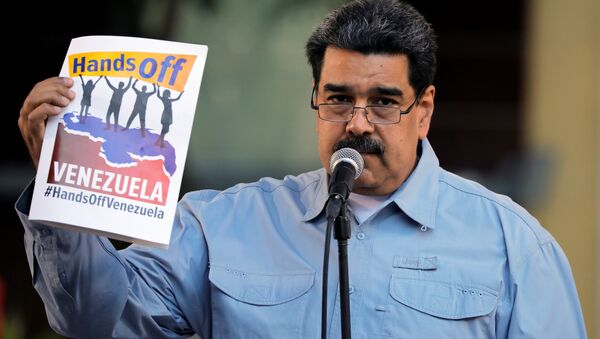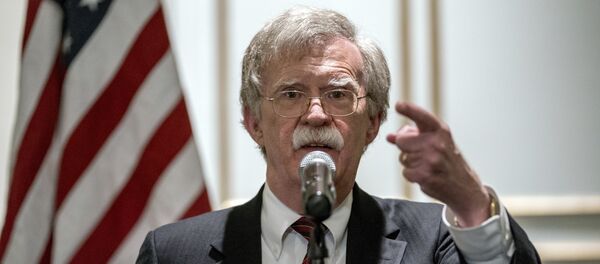"More and more states started having doubts about this strategy and started taking a less aggressive position regarding Venezuela. They talk more about dialogue," Long said.
He commented on an admission made last Sunday by US National Security Adviser John Bolton that the United States was working to build as broad coalition as possible to replace Maduro and his government.
It is not clear what coalition Bolton meant, Long added, but an alliance that is interventionist is not something that will be popular with EU countries that have recognized Juan Guaido, the US-backed self-proclaimed interim president of Venezuela.
"This is something that is crumbling, and not consolidating … So I think it’s the contrary: instead of having a stronger coalition, the alliance is more and more weak," the former diplomat stressed.
READ MORE: Moscow Slams Bolton's Remark About Monroe Doctrine to Venezuela
Change of Heart
Five dozen countries have recognized Guaido, less than half of the 193 states making up the United Nations, Long noted.
The February 23 attempt to bring alleged relief aid to Venezuela was a turning point in the standoff between Maduro and Guaido’s supporters, demonstrating that the government was not on its last legs, Long said.
"We passed a turning point when all those states thought that all this pressure would end by the military turning against Maduro, but this moment of high tension has passed, and Maduro is still in charge of the country. So I think a lot of states are now revising their strategy," he said.
Spain could be one of such revisionists after it reluctantly recognized Guaido early last month. The ex-diplomat said that "one could feel almost a regret to have blindly followed the US in this affair" in a recent speech by Spanish Foreign Minister Josep Borell.
READ MORE: Cuban Leader Rebukes US Plan to Create Anti-Maduro Coalition
He added that many countries appeared to have finally realized that Venezuela was as divided over Maduro’s rule as the global community. Several million people voted for him in last May’s election and many more are suspicious of the opposition and like Guaido even less.
Military Intervention
An attempt by the United States to topple Maduro through force would not have the backing of its EU and Latin American allies, including ones openly hostile to Maduro, like Brazil, Colombia, and Chile, Long argued.
"If there is an intervention it will be in a totally isolated way, by the US only, because even the countries who recognized Guaido do not favour it," he said.
He said a US military intervention in a South American country would be an absolute taboo and a "traumatizing" experience in the long term, leading to an even greater outflow of migrants to neighbour states.
READ MORE: Organisers of Venezuelan Turmoil Failed to Predict Maduro's Resistance — Madrid
Long pointed out, however, that US Special Representative for Venezuela Elliott Abrams had a very "interventionist" set of mind and one could never be certain what the US administration was capable of doing.
Humanitarian Aid
Long said there appeared to be an ethical contradiction between US efforts to deliver what it claims is humanitarian aid to Venezuela and its economic sanctions on the country, which have impaired Caracas’ ability to guarantee access to healthcare, social services and the like.
"Besides its illegal character, we have humanitarian aid which is very, very modest, some millions of dollars, which experts say could feed Venezuelan population for a couple of days. And facing immense sanctions it is a sort of cynicism which should be condemned," he said.
Long emphasized that humanitarian aid could not be used as a political tool and needed to be coordinated with the receiving country in an impartial way. He added the United Nations and the Red Cross had ruled out using aid for political gains, which is against international law.
Maduro has banned US shipments from crossing the border, saying the delivery was a pretext for invasion. The attempt to bring it in from Brazil and Colombia failed last month after clashes broke out between Guaido supporters and border troops.
The views and opinions expressed by the speaker do not necessarily reflect those of Sputnik.



